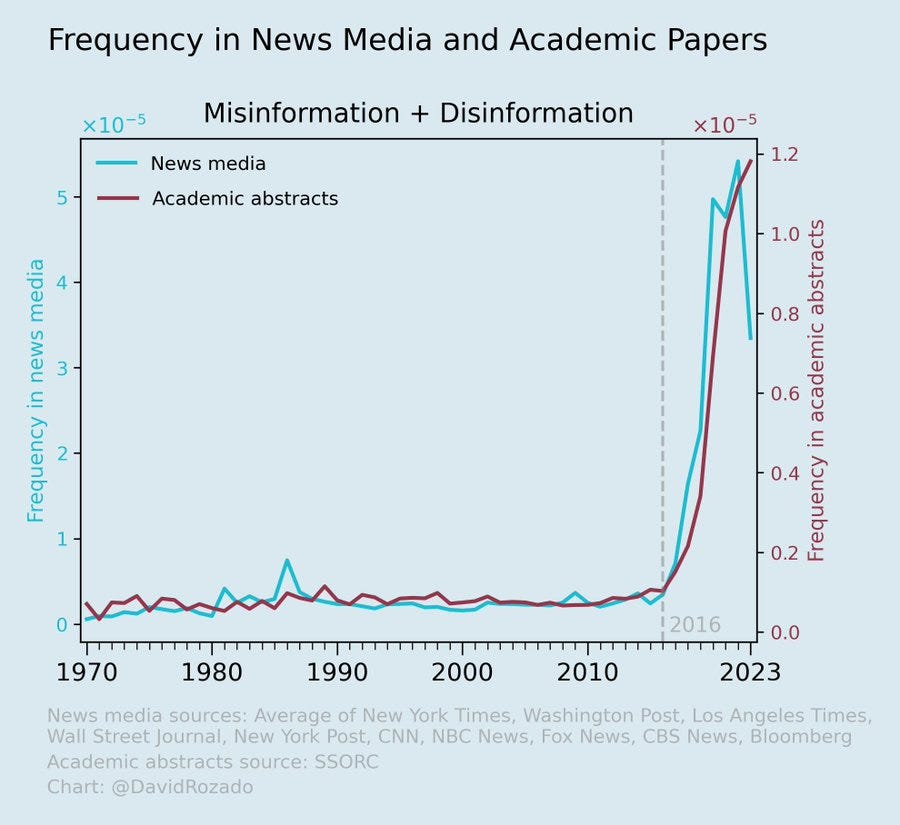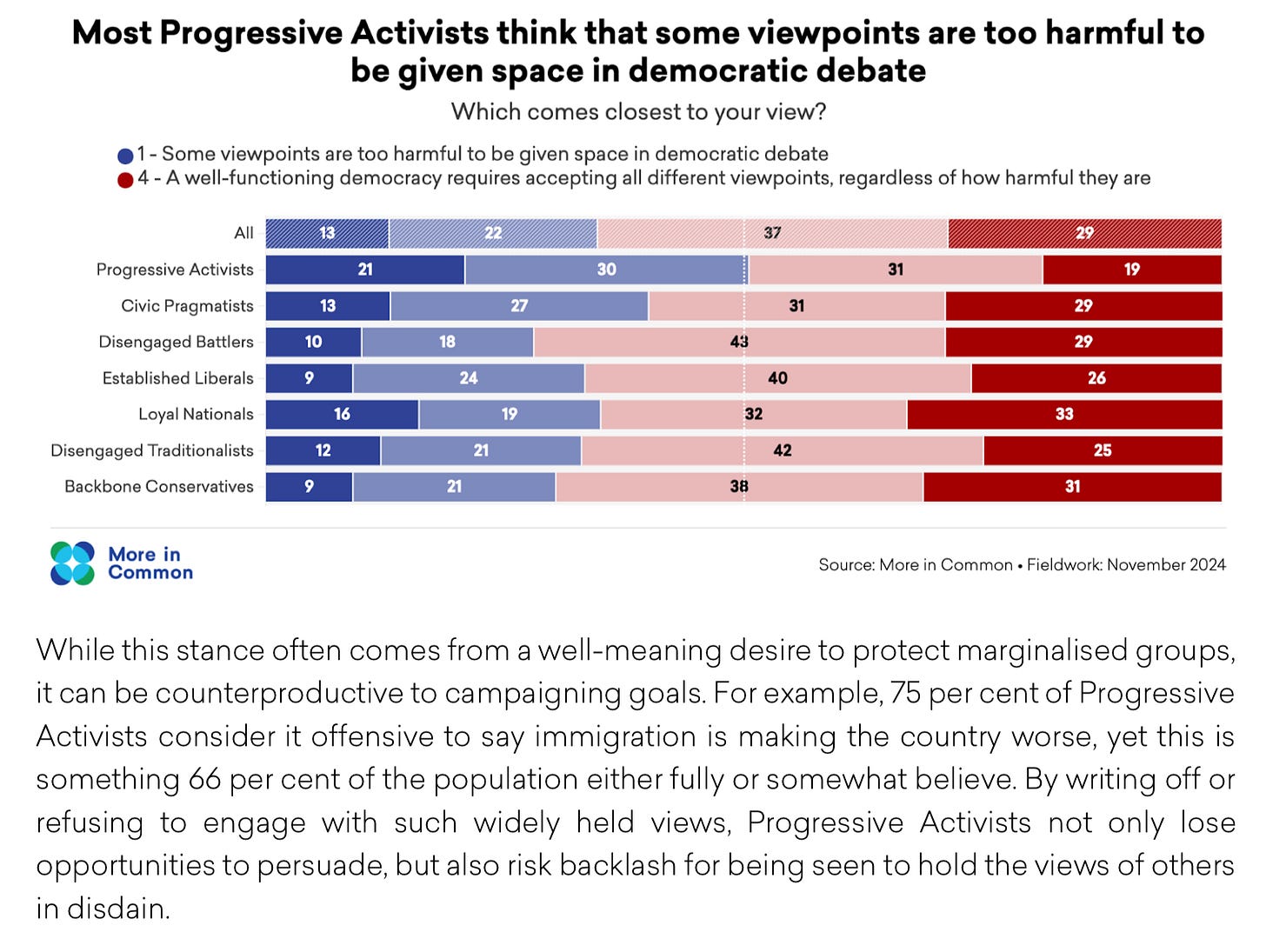The West continues to imitate Dynastic Cycle China
DOGE are the tech-bro Censorate.
Over the course of the C19th, Western states adopted the Chinese notion of appointment by examination for their government bureaucracies. Such appointment-by-merit did have the effect—for about a century and a half—of creating effective and responsive bureaucracies. So much so, that Western democracies gave more and more tasks to such bureaucracies.
This replicates the early stage of the Chinese dynastic cycle—the actual one (see below), rather than the traditional version—where, early in a Dynasty, rule through the bureaucracy is quite effective, even efficient. In modern Western democracies, the legitimacy of democratic action—the demon-in-democracy problem, where the all-trumping legitimacy of the democratic principle tends to overwhelm other ways of doing things—aided the massive expansion in government action, and so in the ambit of government bureaucracy.
The trouble with adopting the Chinese model of appointment-by-merit bureaucracy—including selection-by-examinations—is that folk failed to take a good hard look at the patterns of Chinese government. This despite the fact that the keju, the imperial examination, was introduced under Emperor Wen of Sui (r.581-604) and was not abolished until 1905, so there was quite a lot of history to consider.
The patterns of Chinese government are much less encouraging, because the quite effective, quite efficient, stage of bureaucratic administration does not last. The problem with appointment-by-merit is that it selects for capacity, but not character. Confucianism tries to encourage good character, but it repeatedly turned out to be a weak reed compared to incentive structures. (Almost everything is a weak reed, compared to incentive structures.)
The actual dynastic cycle was:
Population expands due to peace and prosperity in a unified China. This pushes against resources—mainly arable land—creating mass immiseration, an expanding underclass with no marriage prospects, peasant revolts and falling state revenues.
The number of elite aspirants expand—a process aggravated by elite polygyny—but elite positions do not, leading to disgruntled would-be elites who provide organising capacity for peasant revolts (including through sects and cults).
Bureaucratic pathologies multiply, leading to a more corrupt, less responsive, less functional state apparatus, eroding state capacity and increasing pathocracy (rule by the morally disordered). Late-dynasty imperial bureaucracies could be astonishingly corrupt and dysfunctional.
In contemporary Western societies, mass migration interacting with restrictive land use, and other regulation (e.g. “net zero”), so that:
housing supply is blocked from fully responding to demand for housing—thereby driving up rents and house prices; while also
inhibiting infrastructure supply from responding to demand—increasing congestion and other (notably energy) costs
is creating immiseration pressures. Figures about the “macro” health of the US economy, for instance, are misleading as much of the growth is either not reaching people further down the income scale or is failing to compensate for rising rents.
Western commercial societies are sufficiently dynamic that elite over-supply is much less of a problem than in pre-industrial societies. There is, however, very much a problem of toxic parasitism—the entire (Diversity Equity Inclusion) DEI/EDI apparatus to start with. What we might call malign elite employment or bureaucratic parasitism.
Bureaucratic pathologies
It is the third part of the Chinese dynastic cycle—bureaucratic pathologies—that I wish to focus on. Chinese emperors were not blind to the problems of imposing their will on the imperial bureaucracy and the problems of corruption and nepotism. They used various techniques to try and break up corrupt networks, and to counteract unresponsive bureaucratic complacency.
One technique was periodic political campaigns. There were also various mechanisms within the bureaucracy, notably the system of Imperial Censors. A third was to rely on agents outside the bureaucracy, such as eunuchs. Struggles between bureaucrats and eunuchs was a hardy perennial during Chinese dynastic rule.
The value of eunuchs to Emperors was that they could neither sire children nor marry, so lacked those alternative loyalties. They were also very much tied in with harem politics—no intact male could spend the night in the imperial palace, apart from the Emperor. So eunuchs could have much more regular access to the Emperor. This use of eunuchs as an alternative instrument of imperial control extended to eunuch-led inquisitorial bodies such as The Eastern Depot.
Elon Musk is very much the opposite of an eunuch and we are not polygynous societies, so there are not the same dynamics. The advisors and counsellors to the President who serve at the President’s pleasure are a well-accepted part of US Administrations. (Elon Musk’s personal life, on the other hand, may have some analogies, to Chinese harem politics.)
Which brings us back to the Imperial Censors and other bodies such as The Embroidered Uniform Guard. The latter represented empowering a security agency to go after political opponents.
The way that the FBI and other security and prosecutorial bodies have operated as instruments of the politics of the professional-managerial class—including weaponising the national-security state against political opponents, as both the Obama and Biden Administrations did—provoke some uncomfortable comparisons with the latter. The belief that you own morality—so political opposition to your wonderful intentions is morally illegitimate—makes it very easy to do such things. Hence the lawlessness of the Biden Administration.
The nomination and appointment of Tulsi Gabbard as Director of National Intelligence (DNI) and Kash Patel as Director of the FBI are very much about rolling back such use of the national security state.
By contrast, DOGE is an aggressive structure of auditing the Executive Branch. They are the tech-bro version of the Chinese Imperial Censors, of the Censorate.
DOGE is a mixture of people embedded in the bureaucracy and inspectorial task forces, which is similar to how the Imperial Censors operated.
DOGE and the Censorate operate similarly because they are trying to solve the same problem. There is a large bureaucracy, too large for personal oversight by the person they are notionally reporting to: in this case, the President of the United States.
Section 1, Article II of the US Constitution states that:
The executive Power shall be vested in a President of the United States of America …
The President is head of the Executive Branch. The President and the Vice President are the only elected officials within the Executive Branch. Objecting to the President controlling and directing the Executive Branch is objecting to the US Federal Bureaucracy being subject to democratic control.
Such objections on the grounds of defending “Our democracy” are thus really defending “Our bureaucracy”. For—as a result of DOGE’s auditing activities—it has become very clear that much of the US Federal bureaucracy was operating in highly political ways. Much of the networks that have been supporting the politics of post-Enlightenment Progressivism, the politics of Critical Constructivism—aka “wokery”—turn out to be taxpayer funded.
As a friend cruelly observed, leftists generally cannot make money, so they have to parasite off the taxpayer and donors. A lot of the “woke” activism folk have been blaming on George Soros has turned out to have been funded by the US taxpayer, particularly through USAID.
This is a particular manifestation of a more general problem, one that the Chinese imperial bureaucracy also suffered from. The US federal government bureaucracy has accumulated, as large bureaucracies do, various social “barnacles”—that is, collusion networks bleeding off resources that act as a drag on the wider society.
Such networks can seek to outlast the person at the top. This is a particular problem in the US system, with its four-year Presidential terms.
A US President can only serve for two terms. Avoiding Presidential scrutiny for eight years in such a large Federal bureaucracy is surprisingly easy. There is also Congressional oversight, but avoiding or deflecting such oversight is also not so difficult, given the sheer scale of the US Federal Government; especially when Congress has been very lackadaisical about such oversight.
Avoiding such scrutiny and oversight is even easier if, for example, one simply does not add the relevant audit code to items of expenditure, as has apparently been habitual practice across large sections of the US Federal bureaucracy.
So, the Trump Administration has come up with its own version of a mechanism that, in China, dates as far back as the Qin Dynasty (221-206BC): a mixture of embedded auditors and auditorial task forces. DOGE really is the tech-bro version of the Censorate. Right down to also being feared and disliked.
Watching the reaction to DOGE, there is a clear divide between those who think that the current institutional arrangements of the West are basically fine and those who think we cannot continue as we are. The latter includes people who are worried about lack of accountability in state bureaucracies; worried about their declining competence and falling state capacity; worried about fiscal failure; worried about a possible cascading collapse of systems; or some combination thereof.
The British and EU debacles
The UK civil service is currently providing object lessons in declining bureaucratic competence and accountability. As former British PM Liz Truss notes, Labour Prime Minister Tony Blair effectively booby-trapped the British state against Conservatives. As NZ Treasury Secretary Murray J. Horn explained in the book of his PhD dissertation, the functional point of setting up a Quango—a semi-autonomous Government Agency—is to provide on-going services to a constituency insulated from the vagaries of Parliamentary (or Congressional) majorities.
Hence the subsequent 14 years of Conservative rule seemed so often just more of the Blairite same. In Australia, the Indigenous Voice to Parliament was an—unsuccessful—attempt to create a booby-trap against future Coalition Governments.
It turns out, however, that Blair also booby-trapped the British state against any future Governments, including Labour ones. The whole process involved hugely attenuating the role of elections and Parliaments in providing democratic feedback. A process that 40 years within the EU magnified, and lingering European legal entanglements reinforce.
Parliamentary Government proved a long-term success in England-cum-Great Britain-cum-United Kingdom precisely because it embedded feedback from the wider society into the heart of Government. This was particularly so after Henry VIII (r.1509-1547) invented the notion of the King-in-Parliament as Sovereign to prosecute his separation from the Papacy.
It is the stupidity of arrogance of modern progressivism—as the political expression of the professional-managerial class—that it works so assiduously to break such feedback from the wider society; attempting to replace it by the non-electoral politics of institutional capture. It thereby replaces democratic feedback with its own, (allegedly) superior deciding ability, based on mastery of Theory and moral purpose.
Hence their use of terms of moral abuse—racism!, misogyny!, transphobia!, xenophobia!, Islamophobia!, etc.—to attempt to control public discourse and the post-2016 (i.e., Brexit and Trump 1.0) push against mis/dis/mal-information thereby seeking to keep narrative control.
Vice-President Vance’s speech at the 2025 Munich Security Conference was very much a direct assault on that entire exercise. Then again, the EU doubled down on imitating China by attempting to politically unify European civilisation using internationalisation (“pooling sovereignty”) to atrophy democratic feedback. The results have not worked very well.
The profound advantage of European civilisation over China was the technological and institutional dynamism that came from competitive jurisdictions. Via EU harmonisation, the Europeans are throwing that advantage away.
In the case of Britain, frustration—even despair—at the lack of competent responsiveness of the UK civil service is now being expressed within the Starmer Government. But it is precisely their politics—which is the politics of the professional-managerial class that dominates government bureaucracies—that has done so much to reduce Britain to this level of declining state capacity and unresponsive civil service.
The politics of parasitism
Modern left-progressive politics has one aim [function], and one aim [function] only: to insert the professional-managerial class into resources flows wherever possible. Once they are so inserted, left-progressive politics becomes about defending such insertion and, if possible, further expanding it.
This insertion into resource-flows is justified by their grand intentions and the professional-managerial class being both morally and cognitively superior deciders. Their ostentatious moral purpose and mastery of Theory brings this together.
The mainstream media provides narrative control and signalling coordination, hence has become the Pravda model media. A media whose perspectives have become vastly unrepresentative of the wider society.
The left-progressive managerial-professional class insertion into resources flows is shielded by grand intentions, and use of moral abuse, via the Activists’ Fallacy
We are doing X to stop Y,
You are against us doing X,
Therefore
You are for Y.
For example:
We are doing DEI to stop racism,
You are against DEI,
Therefore
You are in favour of racism.
Free speech means using words that have not had their tick of approval, so such speech is illegitimate. Error—disagreement with their moral purpose, thus they can determine error—has no rights, as it is immoral.
This is how free speech becomes “fascistic”. Dissent is frustration of their trumping moral purpose, which is the most wicked thing imaginable, hence is fascism.
Their picture of themselves as the superior deciders—both morally and cognitively—means stripping authority from everyone else. In particular, it means stripping authority from ordinary citizens—particularly working-class citizens—hence the devaluing of citizenship.
Free speech is not about words, it is about the authority to speak. They can declare your words illegitimate: their authority trumps yours.
No authority can be asserted against them: certainly not the authority of truth. For, to assert an inconvenient truth is to show yourself to be a Bad Person and/or cognitively incompetent.
All this operates via mind viruses as economist Arnold Kling defines them:
A mind virus is not merely a set of beliefs with which we disagree. A mind virus is a set of untrue beliefs that includes a defense mechanism against truth-seeking.
This is the mobilising of our evolutionary heritage—our sense of propriety, the patterns of moralised stigma—to block any dissent or criticism: a sort of moral auto-immune disease. Over time, this treating dissent as morally illegitimate has serious effects on one’s understanding. As tech entrepreneur Marc Andreessen notes:
… it causes you to mount a denial-of-service attack on your own epistemic ability to understand reality. In other words, if you have the Ring of Power that basically says you can define anything contrary to your current beliefs as hate speech ot misinformation, then you will never receive valid counterarguments to your own views. That's the intellectual equivalent of taking a hose, hooking it up to the exhaust pipe of your car, and jamming the other end straight into your mouth. You're just going to breathe your own exhaust forever.
If you're only breathing your own exhaust, if you're only believing yourself, and people who are like you, and you're never listening to contrary information—because it's hate speech or misinformation or it's been censored—then there is no limit to how crazy you can get because there's no governor. You are not required to stay in contact with reality. So I think the censorship regime basically worked for these people for quite a while and then, starting probably, I don't know, three or four years ago, it actually stopped working and it's led them into a set of policies that are just bananas. (Lightly edited.)
Entire areas of academe have fallen into such spirals of unreality and epistemic closure, which have spun out into the professional-managerial class more broadly.
The functional claim is that they own morality, so all resources flowing through them are moral resources and all opposition to their use of resources—and to their claims about the world—is immoral, and so illegitimate. (Resources that do not flow through them are not moral; indeed, are presumptively immoral.)
The totalitarianism of left-progressivism—where all dissent is illegitimate and their moral righteousness must be extended to all realms of society, they must be inserted into resources flows everywhere (DEI anyone?), because they are the superior deciders—drove the Tech-bros into the arms of MAGA, giving it an organisational capacity it otherwise wouldn’t have. This was especially from the Biden Administration pressuring media companies to censor and financial companies to debank people, to cut them out of ordinary commerce and finance.
Marc Andreessen again:
I just sort of assumed—and again this is based on everything I had seen over 25 years or whatever of exposure to the government—I just assume that the status quo of, alright [innovation in] atoms are illegal, but at least bits are legal, would just continue. Then these people decided to try to make bits illegal. They voluntarily one morning woke up and decided to do that. They came at bits in the form of crypto, and in the form of fintech, and in the form of AI, and then they were coming for the very foundation of even the software business model in the form of unrealized capital gains.
At that point, if they're able to eliminate—having eliminated innovation in atoms—if they were able to also eliminate innovation in bits, we're done. We're done, economic growth stops. Society goes into decline, [the] economy certainly. Stagnant growth will lead to negative growth. All politics for the rest of our lives are zero sum. The country becomes an incredibly impoverished bitter place and the lights start going out. Step by step by step you can just project this forward. It's just crystal clear what'll happen and it's literally happening in Europe, you can actually see it happening in Europe. (Lightly edited.)
The tension between the Trump Administration and the EU and British elites is—to a large degree—a Transatlantic class war. For President Trump has taken the Republicans back to where they began: as a protectionist Party reliant on working class votes suspicious of foreign intervention.
Once the professional managerial class are inserted into resource-flows, their politics has achieved its aim. It becomes about defending such insertion, and such resource-flows, or further expanding the same. It is not at all about actual human flourishing. Indeed, solving problems is counter-productive, because then the resource-flows are no longer needed.
Needless to say, resources allocated for the sake of such allocation will be neither efficiently, nor effectively, deployed (except in very self-serving senses). This is the politics of parasitism. It is the politics of increasing social dysfunction and declining state capacity. It relies on breaking democratic feedback and accountability.
What is to be done?
What is the solution? Using government bureaucracies—indeed, bureaucracies in general—a lot less is the long-term solution: government education bureaucracies can be abolished to start with. In particular, have no taxpayer funding of moral projects, as such turns bureaucrats into the moral masters of the citizenry, not their servants. (Yes, that means anti-discrimination law has to go.)
Re-invigorating democratic feedback is another part of the solution. Butchering the universities that are the source of this epistemic-closure crap is yet another. (Such as when academics engage in propaganda disguised as scholarship so that the EU elite can continue to use migration as a weapon against its own working class.)
You cannot argue with, or use, folk with “if you disagree with us you are evil and/or stupid” levels of epistemic closure, so you cut off their funding and close compromised organisations. Especially as folk with such levels of epistemic closure are highly manipulatable—including by foreign social-media-influence operations—by playing to their “this is what good people believe” status games, and generate, with their self-righteous insularity, at times astonishing levels of the stupidity of arrogance.
If we could find some systematic test of character—the role duels used to play—that would be great.
In the short term, the solution is some version of what the Chinese developed as a response to the problems of bureaucratic government: some version of the Censorate. The tech-bro Censorate of DOGE is not some weird outlier. If we are to have responsive and effective Western democratic governments, it is presaging things to come.
ADDENDA: A further point of congruence between the contemporary West and dynastic-cycle China is that the Keju directed human capital towards the service of the Emperor. Educated men spent years, sometimes decades, trying to pass the imperial examination, as the potential pay-off from passing for status and income was so high.
The Industrial Revolution started in Britain as it was the first country to move, at scale, from invention-by-experience—which favoured China with its large population, common script, relatively meritocratic society and vigorous commerce—to invention-by-experiment. The Keju minimised the chance that China would have been the industrial breakthrough state.
Modern Western academe has turned into a giant engine to waste and misdirect human capital, including being actively directed towards undermining science. Moreover, the attempt to bureaucratise scientific discovery through research grants, peer review and citation metrics—and the salami-slicing conformism they encourage—does not seem to have been a great success: not least because those same conformist mechanisms are used to launder toxic untruths.
References
Douglas Allen, The Institutional Revolution: Measurement and the Economic Emergence of the Modern World, University of Chicago Press, 2012.
Murray J. Horn, The Political Economy of Public Administration: Institutional Choice in the Public Sector, Cambridge University Press, 1995.
Yasheng Huang, The Rise and Fall of the East: How Exams, Autocracy, Stability, and Technology Brought China Success, and Why They Might Lead to Its Decline, Yale University Press, 2023.
Ryszard Legutko, (trans. Teresa Adelson), The Demon in Democracy: Totalitarian Temptations in Free Societies, Encounter Books, 2016.
Andrew M. Lobaczewski, Political Ponerology: A Science on the Nature of Evil Adjusted for Political Purposes, Red Pill Press, [2006] 2012.
Debin Ma, ‘Rock, scissors, paper: the problem of incentives and information in traditional Chinese state and the origin of Great Divergence,’ Economic History Working Papers 37569, London School of Economics and Political Science, Department of Economic History, 2011. https://www.lse.ac.uk/Economic-History/Assets/Documents/WorkingPapers/Economic-History/2011/WP152.pdf
Debin Ma & Jared Rubin, ‘The Paradox of Power: Principal-agent problems and administrative capacity in Imperial China (and other absolutist regimes),’ Journal of Comparative Economics, (2019), 47(2), 277-294. https://digitalcommons.chapman.edu/esi_working_papers/212/
Mancur Olson, The Rise and Decline of Nations: Economic Growth, Stagflation, and Social Rigidities, Yale University Press, [1982], 1984.
Harold Robertson, ‘Complex Systems Won’t Survive the Competence Crisis,’ Palladium: Governance Futurism, June 1, 2023. https://www.palladiummag.com/2023/06/01/complex-systems-wont-survive-the-competence-crisis/
Daniel Seligson and Anne E. C. McCants, ‘Polygamy, the Commodification of Women, and Underdevelopment,’ Social Science History (2021), 46(1):1-34. https://www.researchgate.net/publication/354584406_Polygamy_the_Commodification_of_Women_and_Underdevelopment
Tuan-Hwee Sng, ‘Size and dynastic decline: The principal-agent problem in late imperial China, 1700–1850,’ Explorations in Economic History, Volume 54, 2014, 107-127. https://conference.nber.org/confer/2011/CE11/Sng.pdf
Yuhua Wang, The Rise and Fall of Imperial China: The Social Origins of State Development, Princeton University Press, 2022.
Xueguang Zhou, The Logic of Governance in China: An Organizational Approach, Cambridge University Press, 2022.














Great discussion and pulling all the threads together. There's another typo in the transcription of Marc Andreessen (great interview, I finally got around to listening to the whole thing) where he's referring to 'unrealised capital gains' (not 'capital games'). As someone living in Europe (Ireland) I am really starting to worry about the future and how we are going to get out of this hole our elites will not stop digging.
American living for several years in Wuhan, amateur but ardent student of Chinese history...and I think these are astute observations, explained very well, and the entire piece is nicely structured making it quite fun to read.
Nice job, thanks much.